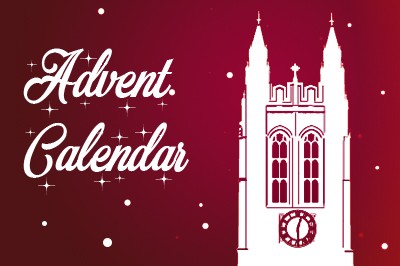Advent is a season in which memory, time, and expectation are fused in surprising ways. It calls us to look back to the past, forward to the future, upwards to heaven, and downwards to earth. It is a time of anticipation in which we can already experience what we await.
The first Sunday of Advent is the start of a new liturgical year, and yet there is a continuity with the end of the liturgical year just finished. The liturgical year ends with readings full of apocalyptic expectation of the coming of Christ as King, celebrated as the feast of Our Lord Jesus Christ, King of the Universe. This year, we heard the story from Matthew’s gospel, in which Jesus judges all people on the basis of their care for the poor (Matthew 25:41–46). Jesus’ return will be a time in which justice will prevail, the oppressed will be vindicated, and suffering will be relieved. Our vision is directed forward to the future.
One would think, then, that the new liturgical year that Advent begins would direct our vision backward to the past, to the birth of Jesus, to the other side of the story. The season is clearly about preparing for celebrating Christmas, about what had already happened when Christ came into the world. But the liturgy instead directs us to look again to the future, to the next coming of Christ. The memory of the past leads to future expectation.
The word Advent simply means “coming,” and in this season refers us to at least two “comings” of Christ: his first coming in the past and his second coming in the future. The Gospel read at Mass is from an apocalyptic section of Mark’s Gospel, in which Jesus admonishes us to be watchful and ready for the time of that coming (Mark 13:33–37).
Such apocalyptic language often fills us today with dread and fear. The word “apocalyptic” conjures visions of terrible and violent events that will cause chaos and suffering. Indeed, there is a style of preaching that uses such fears in an attempt to inspire repentance and holiness.
But such fear is not the spirit of Christianity or of our Advent liturgy. The Church calls Advent “a period of devout and expectant delight.” The opening prayer of Mass for this Sunday asks God for the grace “to run forth to meet your Christ.” There is eagerness for Christ’s coming, not fear, hope that he will come, not dread. We run toward Christ, not away from him.
Jewish apocalyptic expectation was the soil in which the Christian faith grew. The Jewish people were aware that the world was filled with evil and injustice, with the suffering caused by sin. They had been afflicted by it and perpetrated it themselves. Things were broken, and it was a problem that they could only look to God to solve. The first reading at today’s Mass has an early version of that awareness: the people of Israel proclaim that they have gone astray and done wrong, that their suffering comes from their sinfulness (Isaiah 63:16b–17, 19b; 64:2–7). And yet they proclaim their confidence in God to set things right. The Jewish people wanted that to happen. They were not afraid of God’s justice, they desired it, they longed for it. They wanted God to come fix a broken world as only God could.
Christians saw Jesus as God’s answer to this problem, the fulfillment of apocalyptic expectation: the one who had come to bring the Kingdom of God, to liberate the world from suffering and sin. In Jesus, God was setting things right.
We live in a time after the Resurrection, in which God has begun the process of fulfilling those expectations but has not finished. We too live in a world still filled with too much evil and injustice, too much suffering and sin. One does not have to be a prophet of doom to recognize that this year has been filled with terrible events that many would call apocalyptic: pandemic, fires, social unrest, storms, earthquakes, even locusts and murder hornets. Looking down at the reality of this world makes us look up to God for relief. We need God to come and fix a broken world.
The season of Advent is about “devout and expectant delight” that God will do that. It is not simply about the past. Rather, the memory of Christ’s birth in history prompts us to desire and expect his return in the future. We do not fear his coming, however, because he does not come to bring evil but good. We desire his coming, ready “to run forth to meet” Christ. We need God, in this year, more than ever.
And in one final fusion of these horizons, we can meet God now. We do not have to wait for what we anticipate. There is another Advent, a third time of Jesus’ coming, and that is now. As we look back to the first coming that we celebrate at Christmas and forward to his anticipated return, we can run forth to meet him now. As St. Paul says in the second reading today (1 Corinthians 1:3-9), God is faithful, and by him we are called to fellowship with his Son, Jesus Christ our Lord. Our fellowship with Jesus is not just an event in the past, or an expectation for the future, but a present reality.
Boston College C21 Advent Calendar
The Church in the 21st Century Center is celebrating Advent with an exciting, interactive calendar. A different surprise will be unlocked each day of the season, so bookmark the page, and visit daily as we count down to Christmas.



